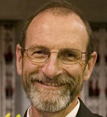Christopher Field, co-chair of the Intergovernmental Panel on Climate Change that shared the Nobel Peace Prize award from 2007, will present “The Velocity of Climate Change,” a free lecture open to the public at 7 p.m. Oct. 21 at the High Country Conference Center.
Field’s lecture, sponsored by the NAU Climate Science and Solutions program, is based upon his work with the United Nations’ Intergovernmental Panel on Climate Change and as director of the Carnegie Institution’s Global Ecology Department at Stanford University.
“Northern Arizona University looks forward to hearing from such a recognized leader in climate change research to campus,” said NAU President John Haeger. “Dr. Field is at the forefront of global ecology and the effects of climate change. His work is essential to shaping the future of this planet.”
Using climate data from around the world, Field and a team of scientists at Stanford have calculated temperature “velocities,” or measurements for how quickly temperatures are changing across the landscape. From that data, projections for the next century are used to predict how fast plants and animals will migrate to keep up with the changes, which the researchers anticipate could guide the development of management strategies that could minimize losses of biodiversity.
“Expressed as velocities, climate change projections connect directly to survival prospects for plants and animals,” Field said. “These are the conditions that will determine whether species move or have to cope in place.”
Field’s lecture coincides with the launch of the university’s new master’s degree in climate science and solutions, which trains students in science, policy and economics. The program is supported by grants from the National Science Foundation and the president’s Innovation Fund, and is expected to meet the high demand for skilled individuals in private and public organizations working to address the global climate challenge.
“Climate change is a daunting challenge,” said Matthew Hurteau, assistant professor in climate science and solutions at NAU. “In that challenge lies opportunity for a new generation of creative leaders to realize and implement solutions that are sound politically, economically and scientifically.”



